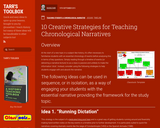
This resource provides instructional strategies for teaching chronological narratives.
- Subject:
- Social Studies
- Material Type:
- Activity/Lab
- Provider:
- Tarr's Toolbox
- Date Added:
- 08/17/2017

This resource provides instructional strategies for teaching chronological narratives.

This parent guide supports parents in helping their child at home with the 6th grade Social Studies content.

This resource accompanies our Rethink 6th Grade Social Studies course. It includes ideas for use, ways to support exceptional children, ways to extend learning, digital resources and tools, tips for supporting English Language Learners and students with visual and hearing impairments. There are also ideas for offline learning.
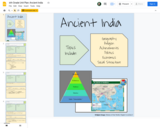
This Ancient Indian Lesson Plan can fit a 1 or 2-week time frame. It focuses on the themes of Geography, Religion, Achievements, Politics, Economics, and Social Structure (G.R.A.P.E.S.). Included in this unit of study is a breakdown of relevant NC Essential Standards, concepts, and skills that match the lesson goals. Some goals will overlap, additional standards and goals can be added to lengthen the unit. Student learning objectives, engagement opportunities, accommodations, and assessment ideas are included.
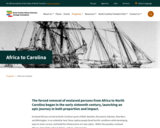
A website resource that provides facts and data that documents the forced removal of enslaved persons from Africa and their arrival to North Carolina.
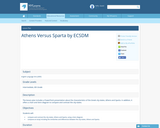
Students will: compare and contrast the city-states, Athens and Sparta, using a Venn diagram. compose an essay including the similarities and differences between the city-states, Athens and Sparta.

In this inquiry, students consider the causes, symptoms, and reasons for the rapid geographic expansion of the disease and how this pandemic affected people of the 14th century and beyond. Through their investigation of sources in this inquiry, students should develop an understanding of the consequences of the Black Death and an informed awareness of the importance of preparing for future diseases and possible pandemics.

In this lesson, students will analyze 16 political cartoons drawn by Clifford and Jim Berryman during the early to mid-20th century. They will search through the Constitution and associate each cartoon with a specific clause. Through networking exercises, students will analyze all 16 cartoons and read the entire Constitution. They will learn about the outline and structure of the Constitution, as well as the content of many of its clauses.
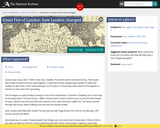
This lesson discusses the Great Fire of London in 1666 and its causes as well as its repercussions long after.

In this lesson, students gain an understanding of North Carolina Native Americans, their way of life and their culture by assuming the role of an archeologist and recreating an artifact that would have been used by Native populations in the pre-colonial period.

This course was created by the Rethink Education Content Development Team. This course is aligned to the NC Standards for 6th Grade Social Studies.

This course was created by the Rethink Education Content Development Team. This course is aligned to the NC Standards for 6th Grade Social Studies.

In this lesson, students will conduct research in order to create a map that shows the many different groups that migrated to the Mesopotamian region in ancient times. The module overview, from which the supplemental resources can be accessed, is located at http://teachmiddleeast.lib.uchicago.edu/historical-perspectives/the-question-of-identity/before-islam-mesopotamia/index.html
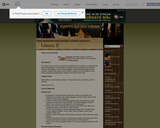
This lesson focuses on the concept of the afterlife and the importance of pleasing the gods and goddesses, the significance of tombs and tomb building, and the burial customs and traditions of the ancient Egyptians. After learning about all of these concepts, students will design a tomb, create a model of it, and complete a short written assignment explaining the design and contents of the tomb.
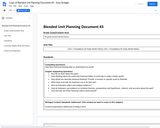
HISTORY H1 THE WORLD IN TEMPORAL TERMS: HISTORICAL HABITS OF MIND Evaluate evidence, compare and contrast information, interpret the historical record, and develop sound historical arguments and perspectives on which informed decisions in contemporary life can be based.
Compelling Questions:
How does historical thinking help us understand our world?
Chapter Supporting Questions:
How do we learn about the past?
Does thinking about the world with historical habits of mind help to make a better world?
How would you describe temporal thinking? Provide a scenario or specific event to illustrate.
What steps and tools do historians use to do their job?
How do historians collect and analyze evidence?
How do historians use evidence to construct theories, perspectives and hypotheses (claims), and accounts about the past?
How and why are these historical claims controversial?

Students read and understand several years of data presented in bar graphs and line graphs. Students will also identify voting trends by race, year, and region.

This inquiry provides students with an opportunity to investigate the role of agriculture in the growth of complex societies. Students will examine sources related to the development of agriculture, the emergence of ancient writing in Mesopotamia, and the rise of social inequalities as they construct an argument in response to the compelling question "Was the development of agriculture good for humans?"

Students will complete a webquest to determine who Alexander was, what he did, and how his accomplishments were meaningful.

This inquiry leads students through an investigation of ancient Hebrew history and Judaism by using various sources that consider the historical and theological foundations, as well as issues related to geography and place.

This inquiry provides students with an opportunity to evaluate a series of innovations by three complex civilizations - Maya, Aztec, and Inca. Students explore how complex societies and civilizations adapt to and modify their environment to meet the needs of their people.